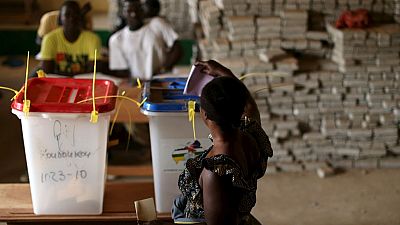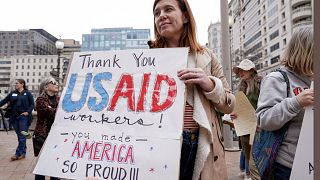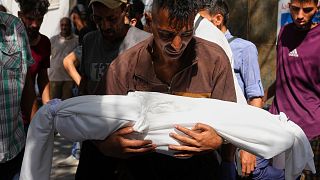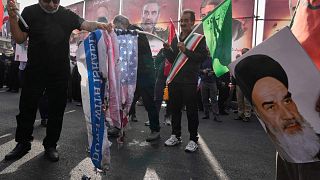Africa
March 20, 2016 is Africa’s own super Sunday. In less than 24 hours, five countries on the continent will be voting in crucial elections ranging from presidential to parliamentary and a referendum on presidential term limits.
Ahead of the polls, the opposition parties in some of these countries have either called for a cancellation of the polls or boycotted it altogether on grounds of ‘fraud.’
Benin and Niger will vote in presidential runoffs. In Zanzibar (Tanzania), it will be re-run of last October’s polls which were cancelled.
Senegalese on the other hand will be voting in an historic referendum in which their president is seeking to reduce his term in office from 7 to 5 years.
Macky Sall’s unusual request comes at a time when some leaders on the continent are changing their constitutions to extend their stay in power.
TOMORROW #Elections coming up #CapeVerde , #CongoBrazza , #Zanzibar 2nd round #Benin #Niger https://t.co/P57aW7TjtG pic.twitter.com/D62vm6Y7j5
— Africa Research Inst (@AfricaResearch) March 19, 2016
Congo Presidential Election
Voters in the Republic of Congo go to the polls on Sunday to elected a president under a new constitution and the opposition is already denouncing the lack of transparency in the electoral process.
President Denis Sassou Nguesso is seeking to renew his mandate after ruling the country for over three decades. He is hoping to get the nod to continue in office after a constitutional change made possible by a referendum in October 2015.
A total of nine candidates are contesting the presidency of the central Africa country with a population of about 4.5 million people.
The changes to the constitution grants Nguesso, the long serving leader, an unlimited term in office. He has promised his followers ‘one touch knock out victory’ in the first round of Sunday’s elections.
But the opposition says that will not happen due to the voter demographics.
General Jean Michel Mokoko is sure the election will go into a second round.
“We believe there will be a second round. Given the electorate, it is not possible that a candidate wins in the first round,” General Mokoko said.
Aged 69, General Mokoko resigned in early February as a security adviser to Sassou Nguesso to contest for the presidency.
“With four other opposition candidates” (Tsaty Pascal Mabiala, Claudine Munari, Andre Okombi Salissa and Guy Brice Parfait Kolelas), “we have signed a charter to win together, and support the one who will enter the second round” in order to block Sassou Nguesso.
Présidentielle au Congo : 650 observateurs étrangers et nationaux attendus https://t.co/9Rf07MYxi5
— ICIBRAZZA (@ICIBrazza) March 18, 2016
Niger runoff
In the west African country of Niger, tension is high ahead of Sunday’s presidential runoff. The opposition has rejected the results of the election even before it is held. The Coalition For An Alternative (COPA) has withdrawn from the presidential race citing the lack of transparency.
COPA was very critical of the first round of the poll held on February 21, which saw the incumbent president Mahamadou Issoufou take the lead with 48 percent of the votes.
President Issoufou and his former ally Hama Amadou, are facing off in this weekend’s runoff poll. Hama Amadou has been in jail since November last year in a controversial child trafficking case.
The opposition lamented the “unfair treatment between the two candidates.”
“The COPA demands a political transition to organize new democratic elections, free, legitimate, transparent and honest,” they said in a statement.
Amadou Ali, a member of the opposition asked supporters and ‘peace loving ‘ Nigeriens to stay home on Sunday.
“We call upon the national and international community to break their silence and to remain vigilant in order to facilitate a climate of sincere political dialogue and calm between all stakeholders, as requested by some civil society organizations,” he added.
Meanwhile, Hama Amadou’s name is on the ballot paper for Sunday’s runoff in spite of the opposition boycott and also the fact that he is currently seeking medical attention in Paris after falling seriously ill in cells.
#Niger: Opposition candidate flown to Paris ahead of runoff polls https://t.co/V1z3wEKX7H #Takara2016
— African Elections (@Africanelection) March 17, 2016
Zanzibar election re- run
The situation is not entirely different in Tanzania’s semi-autonomous state of Zanzibar in east Africa. Here, the main opposition party, the Civic United Front (CUF), on Friday (2 days to the elections), said they would boycott Sunday’s exercise.
The presidential poll was originally held on October 25 at the same time as national elections. The president of the local Electoral Commission (ZEC), Jecha Salim Jecha however, decided to invalidate the results because of “massive fraud”. The opposition had claimed victory in that election.
“The democratic future of Zanzibar is dark,” Nassor Ahmed Mazrui, a senior Civic United Front (CUF) member said.
“There are violations of human rights just because we are opposed to a new poll. But we will continue to oppose it even after the elections,” he added.
The police chief Omar Hamdan Makame warned against any attempts to disrupt the poll saying: “We will do everything to ensure that Sunday’s election takes place peacefully. Those who oppose it should stay home.”
Meanwhile public meetings were banned during the campaign period to prevent violence.
#AfricaLive Tension mounting in Pemba,Tanzania ahead of Zanzibar elections rerun which opposition plans to boycott pic.twitter.com/q6rQj9CD6I
— CCTV Africa (@cctvnewsafrica) March 19, 2016
Benin runoff
Benin appears to be the only country heading into a run-off presidential poll without drama. The battle of businessmen left Prime Minister Lionel Zinsou and Patrice Talon to face off on Sunday.
33 candidates had contested in the first round of the elections. Zinsou’s critics campaigned that he was an outsider, because he spent most of his life abroad and as such did not seem to have done much, even though he garnered over 858 000 votes as against Talon’s 746 000.
As the first country in sub-Saharan Africa to have transited to multi-party democracy, all eyes are on the electorates in the west African country to consolidate this remarkable feat.
“It would seem that voters want a change. They seem to prefer businessmen as their presidential candidates. That’s the first lesson. The second lesson would be that the arrival of businessmen on the political scene has created a shift and politicians are no longer seen as the only option,” Serge Prince-Agbodjan a Political Scientist told Reuters news agency.
No clear favourite as Benin goes for runoff https://t.co/gQwQ3vIvzR via
— Nigeria Newsdesk (NigeriaNewsdesk) March 18, 2016todayngpic.twitter.com/oNZx2Byy5A
Yes or No Referendum
In a sharp contrast to what is happening on the continent, where some leaders are amending the constitutions of their countries to enable them to stay longer in office, Senegal’s President Macky Sall is doing quite the opposite.
On Sunday, the country’s voters will decide if they really want to presidential tenure to be reduced from the current 7 years to 5 years.
The controversy over the presidential term of office has reportedly overshadowed other provisions in the referendum which focus on strengthening the rights of citizens and opposition members, as well as boosting the powers of the legislature and the judiciary.
Critics accuse the “Yes” camp of “buying of conscience” by distributing money and rice during the campaign.
More than 5 million voters are expected to vote in Sunday’s referendum, with the first official results expected on Monday.
— 'Error-Reading' Alfa (AlfaAllahguide) March 19, 2016
macky_sallin a RARE show of an African leader who keeps his word, holds referendum to cut presidential term #Good pic.twitter.com/Ew4XOsZxFm
Cape Verde Parliamentary Election
The Island nation of Cape Verde is also voting in a parliamentary election on Sunday. The African Union has sent a team of observers to that country to ‘monitor and report on the electoral process in accordance with the African Charter on democracy, elections and governance’.
*Parliamentary elections are held every five years through a closed-list of proportional representation system.
*The unicameral National Assembly (parliament) has 72 members.
- The prime minister is nominated by the National Assembly and appointed by the president
Source: Africa Research Institute First results of these elections are expected from Monday.














Go to video
Paraguayan town celebrates vibrant Kamba Ra'anga festival with masks, fire and tradition
01:09
Cameroon’s civil society calls on voters to sanction Biya in upcoming elections
01:47
Chinese city of Xuchang is world's biggest producer of wigs
01:15
U.S. considers adding more African countries to travel ban
01:19
Italy's referendum on citizenship and labour laws fails due to low turnout
01:00
Renewed calls to end plastic pollution on World Environment Day